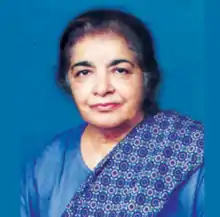Afzal Tauseef
Afzal Tauseef (May 18, 1936 – December 30, 2014[1]), also spelled Afzal Tausif, was a Pakistani Punjabi language writer, columnist and journalist.[2][3][4]
Professor Afzal Tauseef | |
|---|---|
 | |
| Native name |
|
| Born | May 18, 1936 Simbli, Hoshiarpur, East Punjab |
| Died | December 30, 2014 (aged 78) Lahore, Pakistan |
| Resting place | Karim Block cemetery, Iqbal Town, Lahore |
| Occupation | Writer, Columnist |
| Language | Punjabi, Urdu |
| Citizenship | Pakistani |
| Education | English studies MA |
| Alma mater | Oriental College, Lahore Government College University |
| Period | Ayub Khan regime Operation Fair Play |
| Subject | Politics, social, language arts |
| Notable awards | Pride of Performance (2010) |
| Years active | 19xx–2014 |
During her lifetime, she criticized military dictatorship in Pakistan and was detained, later displaced several times by the rulers of that time such as Ayub Khan and Muhammad Zia-ul-Haq. Afzal has authored more than thirty books in Punjabi as well as in Urdu. In 2010, she was awarded Pride of Performance by the Government of Pakistan in recognition of her literary contributions. She was also associated with the Pakistan Peoples Party and served as vice president of Punjabi Adabi Board (PAB) for five years. Afzal also wrote a book titled Dekhi Teri Duniya (I have seen your world).[1][5]
Early life
Afzal was born on May 18, 1936 in East Punjab at Simbli village of Hoshiarpur, British India. She was the only surviving child of her parents during the Partition of India, and then she migrated to Pakistan along with her father who was then posted as a police officer after the country was declared a sovereign state. Afzal initially stayed in Balochistan. She did her initial schooling, including matriculation from a government girls school at Quetta, and later moved to Punjab where she attended Oriental College but left midway due to not-known reasons. Afzal then attended Government College University, Lahore and did a master's degree in English. After completing higher education, she was then appointed as a teacher at the University of Home Economics (formerly a college). Later, she taught English at College of Education until her retirement.[1][5]
Literary career
Afzal was actively involved in writing books and editorial columns. During her lifetime, she used to write for newspapers and published thirty books with different themes such as politics, social issues, and art and languages.[6]
Her prominent books include:
- Punjab Ke'da Naa Punjab (what is Punjab)[5]
- Tahli Mere Bachray (My kids, O Sheesham tree)
- Panjjeevãn Ghanta (the 25th hour)[5]
- Vailay De Pichay Pichay (Following the past)
- Amman Vailay Millan Gay (we will meet in the time of peace)[5]
- Lahu BhijjiaN BatkhaaN (Blood-soaked Ducks)[5] – this book by her describes the family ducks slipping on the bloody wet floors of her family house in the aftermath of Partition of India violence in 1947.[5]
Some of her books were later translated into Gurmukhi and were published in India. She wrote a book on the fall of Bangladesh and Baloch cause, leading her face military trials and detentions.[5] My Beloved Trees, My Children was among her books she wrote about partition.[7] Afzal's main subject was progressive writing.[8]
Awards and recognition
During her lifetime, Afzal Tauseef received numerous awards for her literary works:
- Lifetime Achievement Award by Asian Writers Association, a Denmark-based nonprofit organization[9][5]
- The military dictators, including General Zia Ul-Haq offered her Pride of Performance award several times with agricultural land offer, but she refused. Finally in 2010, once again she was offered the award, this time she accepted and then the President of Pakistan conferred her the Pride of Performance Award.[10][11][1]
Death and legacy
A day before her death, she suffered from health complications and was subsequently admitted to Alshafi hospital for medical treatment. Next day, on December 30, 2014, she died in Lahore, Pakistan. She is buried in Karim block cemetery in Iqbal Town. Her funeral was attended by Punjabi Adabi Board members and representatives of the Pakistan Academy of Letters including writers Kanwal Feroze, Parveen Malik, Baba Najmi and journalists.[1]
A fellow progressive writer of India, Amrita Pritam had compiled a book about her in the Hindi language titled Doosre Aadam Ki Beti and also called her "Suchi Dhee Punjab Di" (True daughter of the Punjab) for her battles which she fought, while facing betrayals but never surrendered.[5]
References
- Ahmed, Shoaib (31 December 2014). "Luminary Afzal Tauseef is no more". Dawn (newspaper). Retrieved 28 April 2020.
- Virdee, Pippa (16 February 2018). From the Ashes of 1947. Cambridge University Press. ISBN 9781108428118 – via Google Books.
- Jacobsen, Knut A. (11 August 2015). Routledge Handbook of Contemporary India. Routledge. ISBN 9781317403579 – via Google Books.
- "Crossed Swords launch attracts scholarly circles". The Nation (newspaper). 5 August 2008. Retrieved 28 April 2020.
- Mahmood Awan (11 January 2015). "True daughter of the Punjab (profile of Afzal Tauseef)". The News International (newspaper). Retrieved 28 April 2020.
- "Literate, NOS, The News International". jang.com.pk.
- Singh, Paramjeet (7 April 2018). Legacies of the Homeland: 100 Must Read Books by Punjabi Authors. Notion Press. ISBN 9781642494242 – via Google Books.
- "Bhagat Singh: Martyr of Lahore | India News - Times of India". The Times of India.
- "The Tribune, Chandigarh, India - Jalandhar". www.tribuneindia.com.
- "Interview: Afzal Tauseef". Newsline. November 2009. Retrieved 27 April 2020.
- "Pride of Performance, Tamgha-e-Imtiaz, Sitara-e-Imtiaz awards conferred". Business Recorder (newspaper). 24 March 2010. Retrieved 27 April 2020.